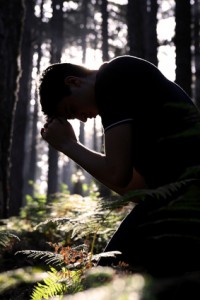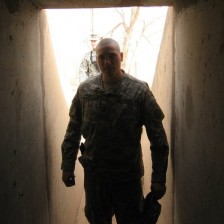 Be still and know that I am God. Let not your heart be troubled, neither let it be afraid. And lo, I am with you always, even unto the end of the world. (Psalms 46:10, John 14:27, Matthew 28:20)
Be still and know that I am God. Let not your heart be troubled, neither let it be afraid. And lo, I am with you always, even unto the end of the world. (Psalms 46:10, John 14:27, Matthew 28:20)
I’m a religious man, but I’ve never begrudged a man (or woman) the right to live according to the dictates of his own heart…so long as he doesn’t want to cut my head off. This naturally leads me to believe that while life, and the situations I might find myself in, will often be difficult; the big man upstairs is looking out for me. In particular I think this can apply to life and death struggles; we can never lose hope in the unlikeliest of situations because anything could happen, and with God all things are possible (Matt 19:26).
As you read this bear in mind that I am lumping two related themes together, those of prayer and belief in God. To me these practices are inseparable; especially in desperation.
Andrew Hough of The Telegraph writes:
Having faith ‘helps patients live longer’, study suggests.
Research into liver transplant patients found those who were actively “seeking God” had a better survival rate than those who did not hold religious beliefs, regardless of which faith they held.
They found some patients were up to three times more likely to survive by having a “strong religious connection”, even if they didn’t attend church.
The study, published in the journal Liver Transplantation, adds weight to previous studies that showed how religion and faith can “influence disease progression”.
Dr Franco Bonaguidi, who led the study, said the study found patients with “high religious coping” who actively sought “God’s help” and trusted their beliefs had a “more prolonged post-transplant survival than patients with low religiosity”.
“We found that an active search for God, (where) the patient’s faith in a higher power rather than a genetic destiny, had a positive impact on patient survival,” he said.
He added it was the “personal relationship between the patient and God, regardless of religious creed rather than formal church attendance that positively affected survival”.
It did not matter what religion a person believed in.
In their study, researchers selected 179 patients who had received a liver transplant between January 2004 and December 2007.
The group, the majority whom were male and middle aged, also completed a “religiosity” questionnaire before being monitored for the next four years after their transplant.
Almost two years later, religious patients were three times as likely to survive as those who did not hold such faith.
After three years, almost seven per cent of the actively “seeking-God” patients had died compared to more than a fifth of non-religious believers.
The researchers concluded that the “search for God factor” coupled with a patient’s length of stay in an intensive care unit were “independently associated with survival”.
One participant, who was not identified, told the researchers that they “recovered” their life through the will of God, which made them “feel strong and calm”.
The study pointed to previous research, which it said showed people with HIV as well as heart patients, kidney dialysis patients had better survival chance if they were religious.
Last month researchers from Penn State University found that losing faith was bad for a person’s health as leaving a strict religion made people more likely to increase their drinking and smoking and were more susceptible to negativity and stress.
That article was written in regards to specific medical situations, but the same rule applies to a more conventional wilderness survival situation. Concerning survival psychology, the One-Stop Survival Preparedness Guide had this to say: If you are spiritually inclined, belief in God or in something much bigger than us can help greatly in overcoming fear. They say that things (problems and challenges) are sent to try us, and it is not so much what happens to us but how we react to what happens to us that really counts. Prayer and faith can also help greatly in a survival situation, as long as we remember that faith is not a replacement for practical action but a partner to it.
God is our refuge and our strength, a very present help in trouble. (Psalms 46:1)
Rachael Rettner, Senior Writer for Live Science in a recent article on religion and mental health wrote:
“People who are more involved in religious practices and who are more religiously committed seem to cope better with stress,” Koenig said. “One of the reasons is because [religion] gives people a sense of purpose and meaning in life, and that helps them to make sense of negative things that happen to them,” Koenig said.
In regards to prayer Clay Routledge Ph.D. had this to say in Psychology Today:
Studies have demonstrated that self-control is like a muscle. That is, it gets fatigued. You can only do so many push-ups before your muscles give out. Similarly, activities that require self-control are fatiguing, making it more difficult to make good choices the more you have to use your “self-control muscle.”…
Recent research indicates that prayer can help you get more out of your “self-control muscle.” Research participants who said a prayer prior to a mentally exhausting task were better able to exercise self-control following that task…Findings such as these suggest that prayer has an energizing effect.
In his book Deep Survival, Laurence Gonzales writes “…Struggling to achieve that essential state of grace and poise, she began praying to keep herself focused. Survival psychologists have long observed that successful survivors pray, even when they don’t believe in a god.”
A last thought also comes from Laurence Gonzales “Many victims have perished waiting for God to help them out instead of recognizing that, whether or not you believe in a god, you must help yourself.”

Well put. Most inspiring even for those of us not necessarily looking to survive in a wilderness setting.
Thank you. I’m always astounded at how many of the survival books I read talk about the importance of faith in a higher being. Both in an emergency situation and just in the trials that come in day to day life.
Jon